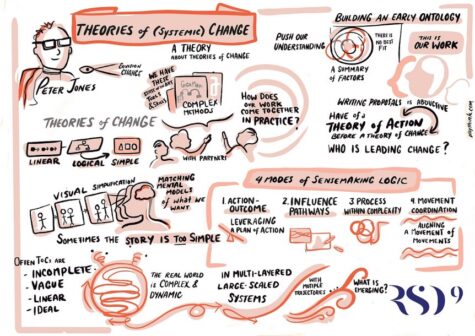While the term “theory of change” is often used by funders expecting an outcome of systems change for their investment, is there really a theory there?
The November 2020 Systems Thinking Ontario session was an opportunity for Peter H. Jones (OCADU) and Ryan J. A. Murphy (Memorial U. of Newfoundland) to extend talks that they had given over a few days for the Relating Systems Thinking and Design (RSD9) Symposium.
The talks covered some early research and conversation on deepening the understanding of “theories of change”. After our usual round of self-introductions by meeting attendees, the core content starts in the web video recording after 12m45s.
The video file is also viewable and downloadable at the Internet Archive,
| Video | H.264 MP4 |
| November 9 (1h56m) |
[ (FHD 203kbps 276MB) [on archive.org] |
The digital audio was extracted from the video, and transcoded to MP3.
| Audio | |
| November 9 (1h56m) |
[20201109_ST-ON_Jones_Murphy_TheoriesOfTheoriesOfChange.mp3] (40MB) [on archive.org] |
Here is the original abstract from the Systems Thinking Ontario November 9, 2020, session.
— begin paste —
Redesigning Our Theories of Theories of Change
Peter Jones presents a customized talk from the RSD9 plenary session for ST ON. Ryan Murphy joins with a full presentation of his RSD9 talk.
We often use the model of “theories of change” to argue for the process by which envisioned change programs might achieve their goals. Essentially these are the working theories by which we explain the logic of system change outcomes, and we often include quasi-systemic logic models to communicate them. ToCs are as ubiquitous in social innovation and philanthropy as business models are in startups and VCs. “Systems change” has emerged as a major movement in the worlds of impact investing, philanthropy, and the NGOs they fund, and the proposals expected to advance studies and change programs embrace the language of the theory of change.
- Do Theories of Change reflect coherent models of change that we can observe or assess in real social systems? If so, are logic models sufficient (do they correspond to reality)?
- How do we Represent Transformation? Framework of four Sensemaking Logics
- What are the meanings, purposes, effectiveness, basis in systemics, their common applications, uses and misuses of Theories of Change?
- Can we produce better theories for change through systemic design rationale
Suggested pre-reading:
- Murphy Jones (2020). Systemic Strategy: Systemic Design Methods for Complex Systems Change. RSD9 Symposium.
- Abstracts from RSD9:
- Peter Jones, “The Social Construction of Systemic Change: Our Working Theories of Change” (parallel breakout session, October 14)
- Ryan Murphy, “Systemic Strategy: Systemic Design Methods for Complex Systems Change” (parallel breakout session, October 15)
- Peter Jones, “Redesigning Our Theories of Theories of Change“, (plenary session, October 16)
— end paste —



